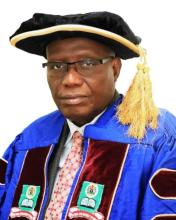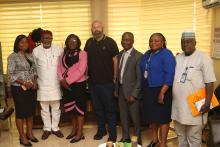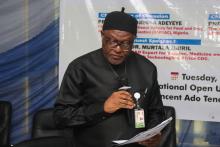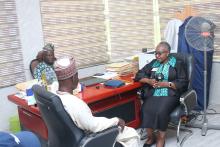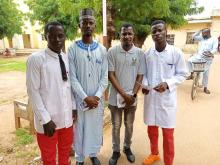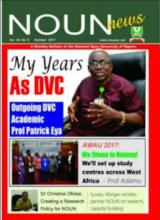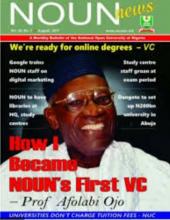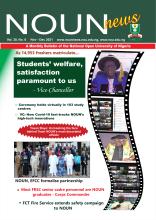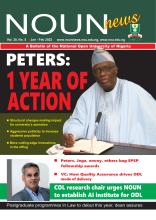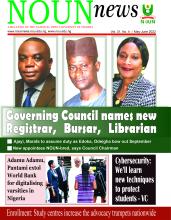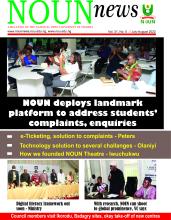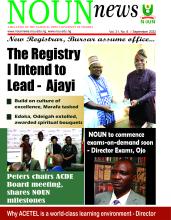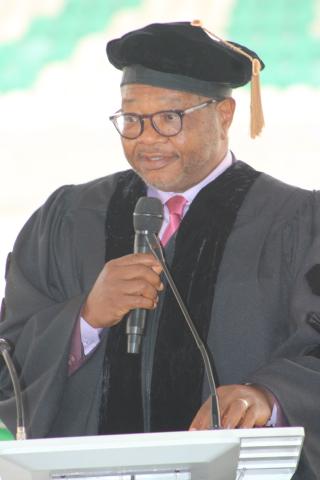
The Director, Institute for Development Studies, Faculty of Social Sciences, University of Nigeria, Nsukka, Prof. Osita Ogbu OON, has said that for the Fourth Industrial Revolution technology to work for the benefit of all, raising the capability and productivity of the poor becomes urgent.
He said significant attention to public schools, vocational education and public health must be prioritized.
He stated this while delivering the 11th convocation Lecture of the National Open university of Nigeria (NOUN), with the theme: The Fourth Industrial Revolution and the Challenge of Poverty Reduction in Nigeria, at the Convocation arena in Abuja.
Prof. Osita, a renowned economist and development expert, said economic growth is fundamental to poverty reduction in the population of the poor in any country and that the economy must grow consistently over a long period of time.
He also stated that agriculture and manufacturing are two (2) critical sectors in Nigeria where the emerging technology-induced productivity rise would help lift many people out of poverty.
Osita, a professor of economics and a former chief economic adviser to president Olusegun Obasanjo, in his lecture, noted that in order to prepare Nigeria for the fourth industrial Revolution, appreciation must be given to the future of work and the skills required to be an active participant in the labor market of tomorrow through gainful employment.
He highlighted four (4) main technologies driving the fourth industrial revolution, which he said can potentially increase productivity growth across many sectors and on the downside it can render many current jobs obsolete.
“There are four (4) main technologies driving the Fourth Industrial Revolution – Artificial Intelligence, Machine Learning, Internet of Things (IoT) and big Data. Space technology is another one, but it is mostly going to be affected by advances in the other four. Other sub-elements of these technologies are: 3D printing and cloud computing. The job of the future will revolve around these technologies.”
“These technologies have the potential to transform every aspect of our lives. They have applications in agriculture, security, education, medicine, services, mobility, governance and the Arts, etc. the impact they could have in our lives has been described as limitless.”
He said, with high unemployment, under employment, fragile employment, huge informal sector employment and many working poor, Nigeria must be concerned about this disruptive technology and their implications for its structural transformational goals, especially manufacturing sector-led industrialization.
He further stated that the Fourth Industrial revolution (IR) will come with a host of new industries and jobs, not just jobs in relation to the technologies mentioned, but also jobs in creative and problem-solving industries; in precision agriculture; in deepening services in mobile banking; in 3D printing that can facilitate the construction of specialized equipment that is associated with the extractive industry; in delivering of education and health services.
Concerned about Africa, Osita said, along with the skills and technology required to have modern education, health and green industries; the skills Africa will need to build are in science, technology, engineering, and Mathematics (STEM). He said skills in automation, logistics, IoT and robotics to increase agricultural output as well as transition to high tech manufacturing and tech-led commercial agriculture.
Speaking on the Fourth Industrial Revolution and Nigeria’s Innovation Gap, Prof. Osita said, one of the ways to replace lost jobs and regenerate growth remains through innovation, much of which will come from start ups.
“It is difficult to find a developed or emerging economy that does not want more start-ups and greater entrepreneurship.” He said.
Speaking further, Osita said, if Nigeria is to close the innovation gap, both the states, the federal government and the private sector must work collaboratively.
“He said, the fourth industrial revolution is upon us, it will come with huge benefits and adjustment costs. Our current state of preparedness, our population and poverty dynamics present both challenges and opportunities.” He said.
“Innovation is required for growth but this innovation must be targeted at addressing the high unemployment rate among the youth, in increasing the skills, capabilities of the poor. And we must also increase, in a very significant way, the domestic contents (inputs) of all our production processes in order to increase the job content.”
Earlier, the Vice Chancellor and chairman of the ocassion, Prof. Olufemi Peters, in his welcome address, said the topic is important because it addresses the issues in the country and also a wake up call if we are not doing enough.
Present at the event were, Pro-Chancellor and Chairman NOUN Governing Council, Prof. Peter Okebukola, Deputy Executive Secretary NUC, Dr. Chris Maiyaki, Mr. AU Mustafa (SAN), Hajia Amina Garba Yusuf, Mr. Victor Antai former Vice chancellors of NOUN, Prof. Abdalla Uba Adamu and Prof. Vincent Ado Tenebe.
Click on the link to watch on YouTube : https://youtu.be/XvPkz0B1AhE
- Log in to post comments
- 87 views


